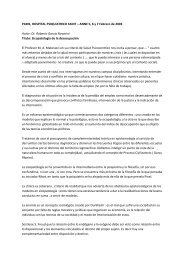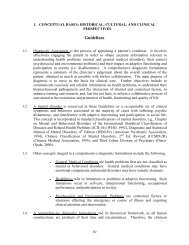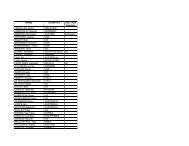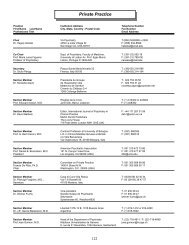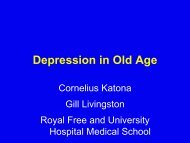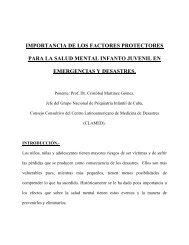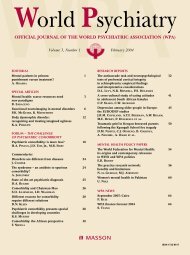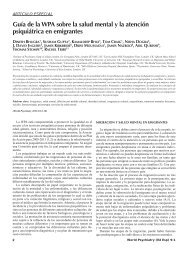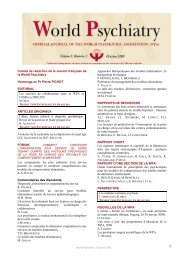ABSTRACTS - World Psychiatric Association
ABSTRACTS - World Psychiatric Association
ABSTRACTS - World Psychiatric Association
You also want an ePaper? Increase the reach of your titles
YUMPU automatically turns print PDFs into web optimized ePapers that Google loves.
oader lessons for psychiatric research and treatment, particularly in<br />
the field of mood and substance use disorders. Furthermore, the crucial<br />
developmental needs of this age group are poorly met by existing<br />
service models and approaches. Young people need a different style<br />
and range of service provision in order to engage with and benefit<br />
from interventions. The need for structural reform and a long term<br />
research agenda is clear.<br />
UL7.<br />
IMPROVING COGNITIVE PERFORMANCE<br />
AND REAL-WORLD FUNCTIONING IN PEOPLE<br />
WITH SCHIZOPHRENIA<br />
M.F. Green<br />
Semel Institute for Neuroscience and Human Behavior, UCLA,<br />
Los Angeles, CA, USA<br />
Considerable efforts are underway to find new treatments for cognitive<br />
impairment in schizophrenia. These efforts have been stimulated by<br />
activities from the US National Institute of Mental Health (e.g.,<br />
MATRICS and TURNS Initiatives) that have provided a pathway for<br />
approval of cognition-enhancing drugs. We present data on new pharmacological<br />
and behavioral interventions that are designed to enhance<br />
cognition and improve daily functioning. For pharmacological interventions,<br />
the cognitive effects of second-generation antipsychotic<br />
medications and anti-dementia drugs in schizophrenia have been<br />
inconsistent and relatively disappointing. This situation has led to<br />
careful consideration of newer types of drugs. Proof of concept trials of<br />
drugs that act on novel mechanisms (e.g., alpha 7 nicotinic receptor,<br />
AMPA receptor, neural protective agents, glycinergic agents) are starting<br />
to emerge and are showing mixed results as cognitive enhancers.<br />
Several behavioral training interventions have been implemented,<br />
including cognitive remediation and errorless learning. These are<br />
showing success in improving outcomes when combined with vocational<br />
rehabilitation. Social cognitive deficits in schizophrenia have<br />
become a relatively new target for intervention. Recently developed<br />
training programs for social cognition are showing promise. Overall,<br />
this is a time of considerable innovation in both the pharmacological<br />
and behavioral treatments for schizophrenia.<br />
UL8.<br />
EVIDENCE-BASED COMPREHENSIVE<br />
MANAGEMENT OF BIPOLAR DISORDER<br />
E. Vieta<br />
Bipolar Disorder Program, University of Barcelona, Spain<br />
The successful treatment of bipolar disorder heavily depends on having<br />
a medical model of the disease in mind. The cornerstones of such<br />
treatment are evidence-based psychopharmacology and psychoeducation.<br />
The treatment of mania can be addressed with antipsychotics,<br />
as all of them have antimanic properties and may have a faster onset<br />
of action than lithium or anticonvulsants such as valproate or carbamazepine.<br />
The choice of the antipsychotic should rather rely on the<br />
safety/tolerability profile and on the availability of long-term data for<br />
that specific compound. As far as possible, compounds with low<br />
extrapyramidal and metabolic side effects liability should be preferred.<br />
The treatment of bipolar depression may be addressed with a<br />
more heterogeneous range of medications, including quetiapine, lamotrigine,<br />
the combination of olanzapine and fluoxetine, and other<br />
combinations of drugs. The long-term treatment of bipolar disorder is<br />
crucial for a good clinical outcome and to prevent cognitive and functional<br />
impairment, and may involve lithium, lamotrigine, valproate,<br />
carbamazepine, quetiapine, aripiprazole, olanzapine, and combinations<br />
of these and other agents. Long-acting risperidone may be used<br />
in highly relapsing patients, and electroconvulsive therapy or clozapine<br />
may be a good choice in treatment-resistant cases. Education on<br />
the disease aimed at the patient and also at the family, caregivers, and<br />
significant others is also essential for a good outcome. Enhancing illness<br />
awareness improves treatment adherence and helps to cope with<br />
stigma; teaching patients on the recognition of early warning signs of<br />
relapse and on effective seek for help may be particularly effective to<br />
prevent relapse into mania; helping patients to understand the potential<br />
impact of legal and illegal drugs on the course of their condition,<br />
promoting healthy sleep and eating habits, and reinforcing resilience<br />
may be very useful to decrease their vulnerability to stressors and to<br />
keep them well.<br />
UL9.<br />
MANAGEMENT OF PATIENTS<br />
WITH CO-OCCURRING SUBSTANCE ABUSE<br />
AND SEVERE MENTAL DISORDER<br />
R.E. Drake<br />
Dartmouth <strong>Psychiatric</strong> Research Center, Dartmouth Medical<br />
School, Lebanon, NH, USA<br />
This paper discusses the clinical implications of past and current<br />
research on co-occurring substance abuse and severe mental disorder.<br />
Past research findings include: a) co-occurring disorders are modal;<br />
b) co-occurring disorders are costly; c) parallel treatments are ineffective;<br />
d) integrated treatment are more effective; e) integrated dual<br />
diagnosis treatment fidelity is important. These findings suggest that<br />
all mental health clinicians need to be skilled in assessing and treating<br />
co-occurring disorders and that all mental health programs need<br />
to be co-occurring disorders programs. Recent research points to several<br />
new findings: a) recovery is multi-dimensional; b) types of interventions<br />
have specific effects; c) group interventions and residential<br />
programs are the most effective modalities for addressing co-occurring<br />
substance abuse; d) relapse prevention is correlated with safe<br />
housing, employment, relationships, and maintenance treatment; e)<br />
supported employment effectively provides a critical recovery component:<br />
structured and meaningful activity; f) subtypes of co-occurring<br />
disorders patients have different treatment needs and different trajectories<br />
of recovery. These findings support using client preferences for<br />
a variety of interventions; long-term programs; emphasizing groups,<br />
residential services, and supported employment; and developing person-centered<br />
algorithms for interventions. Several other research<br />
findings, related to families, trauma treatments, and other aspects of<br />
co-occurring disorders, are less clear.<br />
UL10.<br />
COMPREHENSIVE MANAGEMENT OF BORDERLINE<br />
PERSONALITY DISORDER IN ORDINARY CLINICAL<br />
PRACTICE<br />
M.H. Stone<br />
Department of Clinical Psychiatry, Columbia College<br />
of Physicians and Surgeons, New York, NY, USA<br />
Within the past decade, manuals containing treatment guidelines<br />
have been developed for a number of the different, and currently popular,<br />
approaches to the therapy of borderline personality disorder<br />
(BPD). Among these are manuals of transference-focused psy-<br />
5




